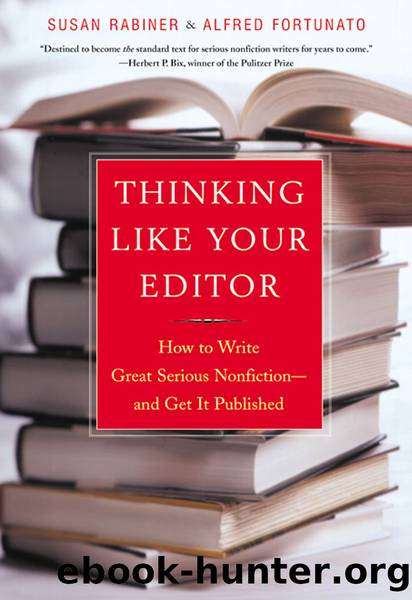Thinking Like Your Editor by Susan Rabiner & Alfred Fortunato

Author:Susan Rabiner & Alfred Fortunato
Language: eng
Format: epub
Publisher: W.W. Norton & Company, Inc.
Published: 2002-07-14T16:00:00+00:00
1. Command
The indispensable predicate for effective argument is command of your subject matter. You will not be comfortable putting disparate elements together, distinguishing this from that, generalizing from specifics, and suggesting a new, maybe counterintuitive reading of the data unless you have done your research thoroughly and know what you have.
Many authors decide their interpretation too early in the research process and so narrow their search at the very time they should be opening it to the broadest possible base of information. They close off certain critical leads, often out of fear they will stumble onto support for competing interpretations. Having decided upon their thesis, they don’t want to be exposed to information in conflict with what they set out to say. The research is just about providing examples.
Some, despite their best efforts, find themselves face to face with material they wish they had never seen, so they ignore it, hoping it will go away. Spare yourself grief. This is a research problem an author can’t hide from. There is a sort of Murphy’s Brother’s Law in publishing: Whatever You Think You Know That Nobody Else Does Will Be Revealed and at the Very Moment Most Embarrassing for the Author.
Other authors shut down the research stage prematurely because they find themselves getting tense as their research leads to complexity. Perhaps causality is becoming clouded, or blame broadening. They are afraid of losing themselves, and their thesis, in a maelstrom of conflicting data.
Research is always time consuming and labor intensive, and often frustrating. Fortunately, bookstores offer a number of books that communicate broadly acceptable standards. Moreover, my experience with college students I have taught and my own authors indicates that students, especially graduate students, are given a sounder footing in the uses of research, including established standards for attribution and citation, than in the limits of argument. What I am talking about here is an attitude, not research skills. Think of the transition from data to reader as a funnel, in which the wide end must be at the interface with your data, not the reader. If the other way round—for instance if you limit your sources of information, or reject information early on in the research process, when you should be most open to everything—what comes out of the wide end of the funnel is quickly spotted as diluted, stretched too thin, as having too much breadth for its substance.
This is not to say that you must use everything you find. On the contrary, you must limit yourself to material that bears relevance to the question your book is asking. Including material too peripheral to your story, simply because you found it and don’t want it to go to waste, waters down your manuscript. A reviewer who wants to praise an author will often say she has an ear for the telling anecdote. If one anecdote after another tells nothing relevant, that same reviewer will likely say the book suffers from a lack of editing. So when in doubt, leave it out.
Download
This site does not store any files on its server. We only index and link to content provided by other sites. Please contact the content providers to delete copyright contents if any and email us, we'll remove relevant links or contents immediately.
Kiss My Asterisk by Jenny Baranick(1215)
The Only Grammar Book You'll Ever Need: A One-Stop Source for Every Writing Assignment by Thurman Susan(1205)
Writing CopyFor Dummies by Jonathan Kranz(1196)
BRADBURY, Ray by Zen in the Art of Writing (pdf)(977)
English Verb Tenses Up Close by Mark Lester(950)
Writing Fiction by Gotham Writers' Workshop(918)
The Copywriter's Handbook by Robert W. Bly(793)
It's Never Too Late to Begin Again by Julia Cameron(776)
Telling Lies for Fun & Profit by Lawrence Block & Sue Grafton(747)
crafting dynamic dialogue by editors writers digest(747)
The Psychology Workbook for Writers by Darian Smith(742)
How to Not Write Bad by Ben Yagoda(716)
The Grammar Devotional by Mignon Fogarty(716)
The Book of Ruby(681)
100 Successful College Application Essays by The Harvard Independent(666)
Writing Tools: 50 Essential Strategies for Every Writer by Roy Peter Clark(651)
Steal This Plot: A Writer's Guide to Story Structure and Plagiarism by William Noble & June Noble(626)
How to write Science fiction and Fantasy by Orson Scott Card(613)
Inland by Gerald Murnane(611)
